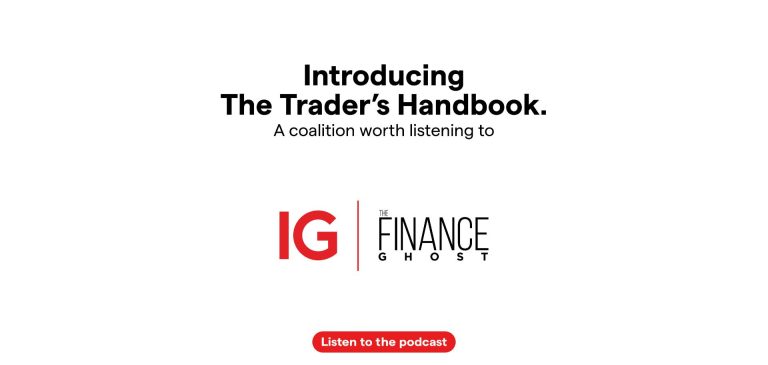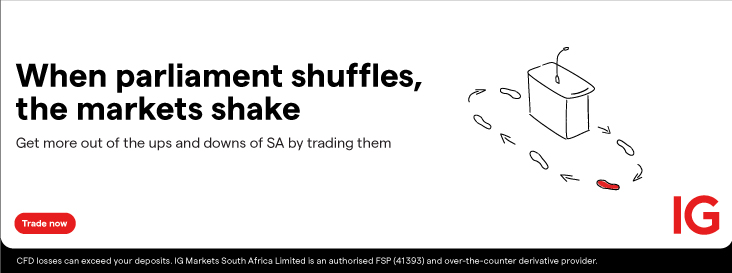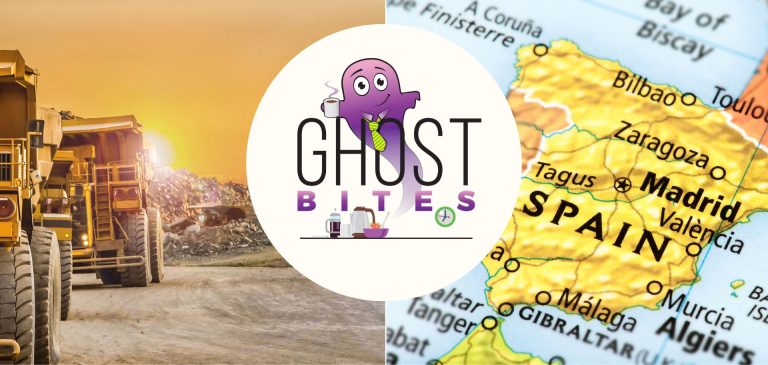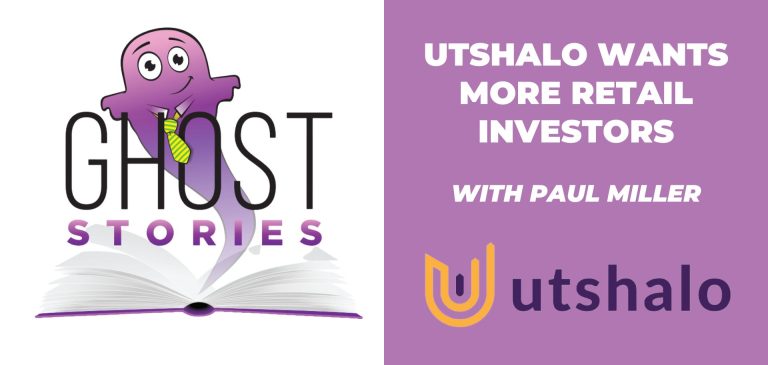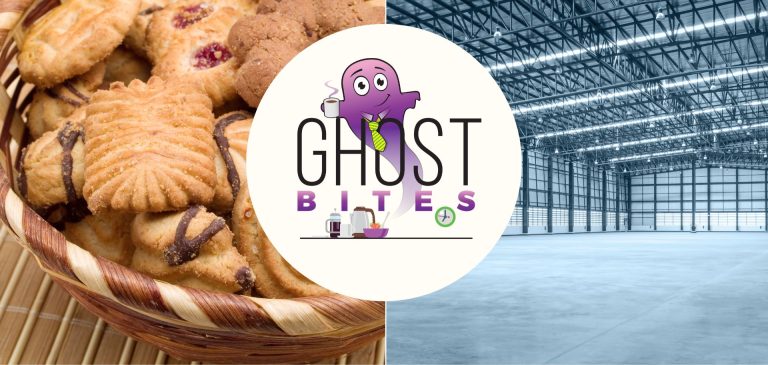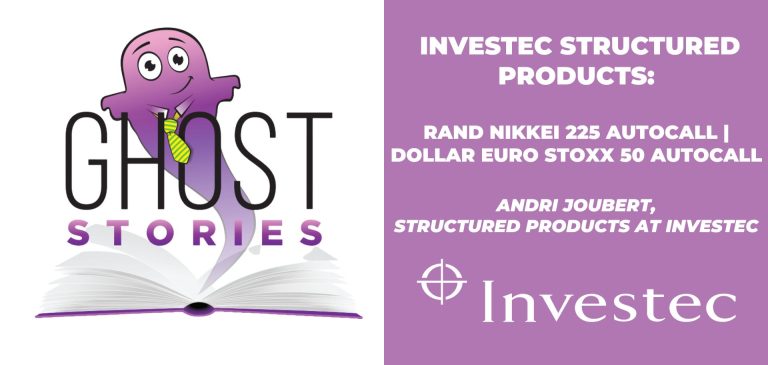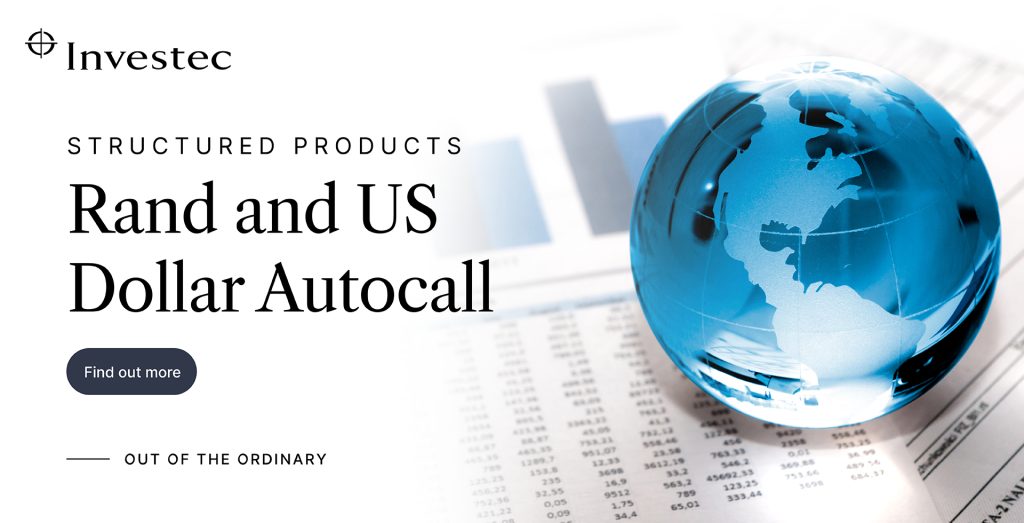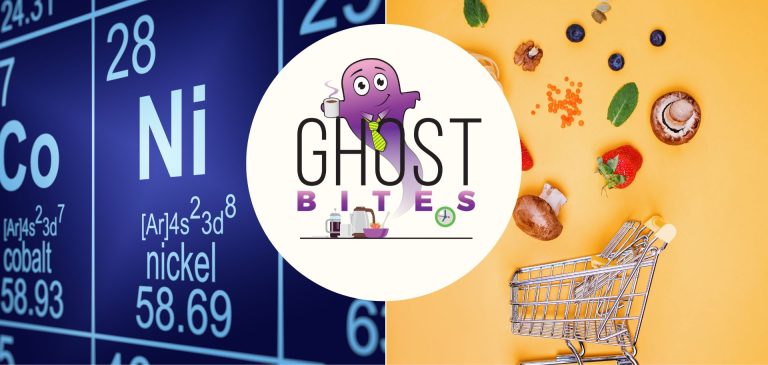The Trader’s Handbook is brought to you by IG Markets South Africa in collaboration with The Finance Ghost. This podcast series is designed to help you take your first step from investing into trading. Open a demo account at this link to start learning how the IG platform works.
Listen to the podcast using the podcast player below, or read the full transcript:
Introduction: Welcome to the Traders Handbook, a limited podcast series brought to you by IG in partnership with your host, The Finance Ghost. Over the course of our upcoming episodes, we are delving deep into the world of trading, helping both novice and seasoned traders alike navigate this exciting field. Join us as we unravel the intricate strategies and insights that define this dynamic landscape and the beautiful puzzle that is the markets. IG Markets South Africa is an authorized financial services and over the counter derivatives product provider CFD. Losses can exceed your deposits.
The Finance Ghost: Welcome to the second episode in this series called the Traders Handbook, and you’ve hopefully now listened to episode one, which set the scene of what it is that we are up to here and certainly what we are hoping to achieve. And of course, the point overall is to bring you great insights into the world of trading. We certainly hope that your IG demo account is set up by now. If you haven’t done that, you totally should. It’s quite an easy process and there really is nothing quite like seeing it on your screen. All those wonderful tickers and red and green and all the data points and the charts and all the cool things you can do with it. There’s nothing quite like having that on your screen.
So if you haven’t set up your IG Demo account, then please go and do that so that you can have a bit more context to what it is we are talking about. I set mine up about a week or so ago, Shaun, and I’ve even put on my first trade, but we can of course get to that later.
First, let me just remind the listeners that although I am hosting this podcast for IG as The Finance Ghost, the insights are really coming from Shaun Murison, who is a senior market analyst for IG. And Shaun, I really look forward to the second show, and I think we may as well start right at the beginning. We touched on this a little bit in episode one, but I’m going to hit you as part of saying hello to you with the most basic first principle question of them all: What is trading?
Shaun Murison: Hello. Short-term trading, very, very simply is looking at trying to generate a short-term profit in financial markets across different asset classes. It could be forex, commodities, indices, shares, local shares, international shares – and generally uses instruments like CFDs, leveraged instruments. Sounds complicated, but it’s still looking at the same products that you’d be used to trading for normal investing, they just carry a degree of leverage. What that means is it just magnifies your profits or losses within the market, so it allows you to get in and out quicker.
The Finance Ghost: And of course, here when we say instruments, we don’t mean a Yamaha piano, we mean a type of financial – well, I actually don’t know how to describe it, really. It’s effectively a financial contract, a financial asset. That’s what the “C” in CFD stands for is Contract For Difference. When we talk about a financial instrument, we’re basically just talking about this thing you buy in order to express a view on a particular underlying asset. It’s a strange term for those who aren’t necessarily familiar with the markets.
Shaun Murison: Yeah, obviously CFD, as the name implies, Contract For Difference, it really is just a contract for the difference in price of whatever you’re trading. If you’re looking at buying a share on the JSE, for example, you bought it for R10 and you sold it for R11. The contract is for the different in price. That difference would be one rand, and you’d make one rand for every share that you had.
The Finance Ghost: What’s interesting with that is you can make money if the share goes up and you can make money if the share goes down, depending on whether you went long or short. And we’re going to get into all of that stuff as well on the show, along with some of the detail on the different ways you can use these CFDs, the different instruments you can trade, the different underlying assets that you can reference when you trade, because of course that’s really important as well.
But I think before we get to some of the plumbing around how you actually do this stuff, recognising that trading is really this kind of short-term profit strategy – at the end of the day, that’s what makes it different to investing, it’s all about getting those short-term gains – is it a different type of person, perhaps, who should consider trading vs. investing? Are these people who naturally just want to be more active in the market, as opposed to a once-a-month debit order into an ETF and they build up their wealth over time, which of course there’s absolutely nothing wrong with. And I think all traders are doing that anyway as investors. Trading is just something a little bit different to that, isn’t it?
Shaun Murison: Yeah, I think trading could form part of investment portfolio. It is obviously seen as a higher risk way of accessing financial markets, so it shouldn’t be the bulk of your investment portfolio. But anyone who is interested in speculating in the market, this is a product they could consider. It doesn’t just have to be used for speculation as we’ve talked about in the past, you know, you can use it to insure or hedge an underlying portfolio. You’ve got a whole big basket of South African shares. You could take a short position on the index, the JSE All-Share Index or the Top 40 Index. And if the market does come down, you’d protect the value of those underlying assets.
Trading is for anyone that is interested in a speculative addition to their portfolio or someone who is looking at hedging out some risk in an underlying equity portfolio.
The Finance Ghost: And in terms of theoretical knowledge, I think on fundamental investing, people understand that they need to be able to read financial statements, they need to work through an earnings transcript or an annual report or whatever the case may be. You need to read quite widely, you need to be on top of news flow. There’s a lot of fundamental stuff that goes into a successful investment, because at the end of the day, you’re trying to find some kind of company or whatever it is you’re buying that will give you this great long-term risk-adjusted return. Instead of going and just buying the JSE Top 40 ETF or an S&P 500 ETF, you are looking for stocks that on a risk-weighted basis will beat that index – that is, beat it considerably over a period of time, which is in and of itself a difficult thing to do.
Now, trading is also a difficult thing to do, but I think the theoretical knowledge base that you need to get it right is a little bit different. I mean, that’s where the sort of technical trading skill set really comes to the fore, which is learning how to read charts.
Shaun Murison: Yeah. So, charts, obviously, a lot of people that come to financial markets from a trading perspective, they aren’t financial advisors or asset managers. And they learn to understand what’s happening in markets by looking at technical analysis, looking at charts.
In the short-term, when you look at markets, it’s a voting game. You’ll see news come out, news drives sentiment and markets react very short term to that sentiment. Whether it’s a company releasing results or we have an inflation reading out of the US or locally, that’ll drive some sentiment in markets and you’ll see a move. And when we’re looking at technical trading, what we’re doing is we’re trying to just sort of catch that momentum because we are just trying to catch a small move within that market. So if it’s positive sentiment, the market might go up and you’re trying to catch a piece of that move higher. If something negative comes out, you might see the market fall a little bit and you can try to catch that move lower.
It’s yeah, like I say, short-term, it’s a voting game and you’re trying to just be on the right side of the vote.
The Finance Ghost: Yeah, I remember that point you raised in the first episode in the series was this concept of a voting game. And, you know, that’s a really good way to put it. I mean, we’re in a serious election year at the moment for a lot of democracies around the world. And of course, votes lead to volatility and surprises and people not necessarily voting in the way you expect. And I guess the markets are exactly the same. It’s about understanding that sentiment and how it swings and where it swings and knowing when to get out of the way of that, knowing when not to fight the market and knowing when to say, hang on, maybe the market hasn’t noticed this. Maybe I’ve spotted something really interesting here. Let me take a view on it.
Shaun Murison: I think just adding to that, it’s also just being aware of it. So when we’re trading we’ll do our analysis and we’ll have ideas around the market, but know when those high impact data points are coming out.
Inflation has been a key theme in global markets for quite a long time now because that drives interest rates and monetary policy, which obviously affects equity markets, bond markets. And so just being aware of when that data is coming out, I think that’s a good starting point for traders is to just have an economic calendar out there. There’s lots of places where you can access that. IG has an economic calendar on its website and a lot of those data points say, well, this is what’s expected of the news and this is what it was previously. Generally, if it’s better than expected, it’s positive for short term market sentiment. And if that news comes out and it’s worse than expected, well, it’s negative for market sentiment and expect the prices to go down. So, first port of call there, I think, is just be aware of news and docs coming out and trade accordingly. And if that is a high-risk data point and you don’t want to be involved in that market, if you don’t want to take that extra risk, then you can always just sit on your hands and wait for the next opportunity.
The Finance Ghost: This actually brings us to a really interesting concept around trading, and maybe it speaks to the type of people who should look to get involved here and what sort of commitment you’re really making. And obviously it depends. There are traders who do this for a living. There are many traders who do it for a living. That’s obviously the hardest way to do this because you literally eat what you kill and you can very quickly hurt yourself in the markets if things go wrong. That’s maximum pressure trading. Obviously, there are ways to do it on a much, much smaller scale, which I think is how most people would do it, is to say, this is part of my portfolio. I still have a day job. I’m not sitting there trying to scalp little amounts off the market all day long because your boss probably won’t approve of that too much. So, you know, this is about just understanding what are some of the things you’re willing to get involved in, what are you not willing to get involved in and why? And I guess regardless of whether you are doing this full time or you are doing this part time, you still need to have a plan, whether that’s for your trading day or your trading week or, you know, whatever the case may be. So how do you kind of build that out? I mean, you’ve already referenced there some of the economic releases and just having a proper idea of that calendar, you know, are these tools available within the IG ecosystem? And I’m sure the recommendation would be that people just also read widely to make sure they’re getting, you know, all kinds of different inputs here.
Shaun Murison: Yeah, there’s lots, we do have lots of tools available to subscribers. A lot of that data is free. So we have daily and weekly newsletters. You know, on Friday we do something called Week Ahead. It’s hosted on the website. So anyone can just access that. Just painting narratives around different types of markets, you know, what’s happening in the commodity space, what’s happening in the index space, what’s happening with local shares, and then also just helping plot those calendars. On the daily updates, what we’ll plot there is which companies are releasing results within the morning – companies to watch out for. Any broker recommendation changes that we’ve picked up, upgrades and downgrades to local equities. There’s a whole lot of free information out there. Just really accessing it and just putting it into the right place, you know, that type of content is aimed at the trader just trying to get context, understanding the narratives of what’s happening in markets that we can hit. And IG actually provides a live Reuters feed directly into the platform so you can access live data from a broadcasting leader.
The Finance Ghost: Okay, fantastic. So I think let’s move into what really distinguishes CFDs from your typical equity investments. And I’m just using equity as the example there. And it’s a concept that people hear about, but they don’t really understand. And it scares them. And in some respects it should scare them, because if you don’t use it properly, it can hurt you. But if you do use it properly, it’s very powerful. And that is this concept of leverage. I think a worked, not necessarily a worked example, but just the basics. You know, how much leverage sits inside a CFD on the IG platform? If I have R1,000 to invest and I just go and buy shares, I’m handing over R1,000 and I’m getting that value in shares, okay? Less fees. And that’s a basic share investment. What would that R1,000 look like in a CFD context with that leverage?
Shaun Murison: Okay, so it really depends on the product that you’re looking at. I think a lot of your listeners might be more familiar with equities and shares, so let’s use an example.
Leverage is how much more you get from that R1,000. So essentially, if you were to buy a share, put down that R1,000 as a deposit, you might get R10,000’s worth of that share to trade with – so essentially ten times more. I’m just using that as an example. It does vary from share to share. Sometimes you might get five times more than what you put down. Sometimes you might get a little bit more. It just depends on the risk profile of the share that you are trading. Essentially what that allows you to do is magnify your profit or loss.
The Finance Ghost: And the extent of magnification is riskier, right. Because small moves in the underlying asset then have a bigger impact on your money that’s sitting there invested.
Shaun Murison: Yes. So if you have a 1% move on that share price would be equivalent to a 10% move on your CFD position. If it’s in your favour, you’ll be making 10% as opposed to the 1% on the underlying share. If it was against you, you’d be losing 10% rather than losing the 1%.
The Finance Ghost: And then how does it work in terms of posting margin? Because that’s another term that typically gets used in these types of trades when people talk about margin. If you read financial statements, you understand margin to be the money you make off a particular revenue number. It’s a bit different in this world. So what does margin mean in the context of CFDs?
Shaun Murison: Margin is basically just another word for deposit. And so, an example, let’s say you wanted to buy R100,000’s worth of shares. You wouldn’t have to outlay that full R100,000 for your position. You just need to put down a deposit for that position, which we refer to as margin. So if that deposit was R10,000, to get movement from R100,000’s worth of shares, that would also be referred to as your margin. Margin / deposit, same thing.
The Finance Ghost: And the way the margin is calculated varies, I think, per underlying asset class or whatever the case may be. Right?
Shaun Murison: Even with shares. If a share is less liquid, you know, more volatile, then we might ask you to put a larger deposit down for that. If the share is a lot more liquid, less volatile, then you’d see smaller margin requirements or deposit requirements.
The Finance Ghost: So margin, super interesting, margin and the way that works is certainly something that can really magnify your returns, as you said, but something that you then need to be careful of and manage accordingly. That’s why I think getting something like a demo account is just such a clever way to do it so that you can actually go and put on trades and watch your margin go into the trade, like I did with mine recently, and then watch the profit and loss and see what actually happens. It’s such an important part of it, right, is to do that demo trade.
Shaun Murison: And I think just on that, you open an account and let’s say you put in R50,000. I would say never take that full R50,000 and put it as a deposit for one trade, because if it moves against you, then you’re going to be in trouble. Take a portion of that. If you’ve got R50,000 in your account and you have to take one position, you could use R5,000 as a deposit, and you’d have R50,000’s worth of equity in the market as a CFD position, as an example. You actually don’t have to leverage up your whole account, but never take all the money in your account and put it into one trade as a deposit if you want to. Unless you really want to gamble it.
The Finance Ghost: Yes. Or commonly known as blowing up your portfolio, if it goes wrong.
Shaun Murison: Yeah. Money management becomes a key aspect to determine your success and failure in this game. You know, when you are trading, we’ve talked about it being a high-risk environment, but you can control that risk, and there are lots of tools available to you to help control that risk. We have things like stop losses. You can actually predetermine the risk that you’re taking in a trade. So you say, well, look, I only want to lose, R1,000. You can have your stop loss x points away from the price that you buy at or that you sell it, from your entry point. And so even if you’re not in front of your computer and your computer’s closed, you can pre-determine your loss in the event that things move unfavourably against you. Obviously, that’s not what we aim for, but in a high-risk environment, you can protect that. So that’s not the desired result, but you just hope for the best, prepare for the worst. You can pre-determine your losses to an extent and control your risk.
A lot of money management does come into play with short-term trading. It is one of the more important determinants of your success or failure in trading.
And with that also comes the discipline of being able to execute. We’re not always going to get it right, so it’s just being prepared. Hope for the best, prepare for the worst.
The Finance Ghost: It’s interesting because, of course, in investing, there’s a whole school of thought that says a highly concentrated portfolio is the way you beat the market. You know, you go and you pick your five or six winners and you really put a lot of money behind them. And of course, it’s great if you’re right. You know, hindsight is incredibly helpful here.
Concentration – I’m personally not someone who does that. I prefer to have quite a few smaller positions because I know how much randomness there is in the market and also just negative surprise. You know, sometimes a company will truly shock you. News will break and a share price will take a 20% bath. And if that was a big proportion of your portfolio, you’re now in serious trouble. So I guess in trading, the concentration risk issue is even worse than it is in investing, because if something goes against you in a trading portfolio with leverage, it can literally wipe you out. Whereas in investing, you can’t lose more than you’ve put in when you’re investing in a company. So I guess the question there is, Shaun, is one is would you agree that in terms of concentration risk, I think trading is more severe than investing? And then maybe the second point, which is something I’ve touched on there, this concept of losing more than you’ve put in, like, how does that actually work? So if I’ve posted margin of R10,000 on a position and the thing moves against me in a way that basically my R10,000 is gone, is that trade then closed on my behalf, or is it possible to lose more than that before something actually happens with that trade?
Shaun Murison: So if you’re in a position right, you need to ensure that in your account that you have, at all times enough to cover the deposit for your trade, that margin we’re talking about, and any loss that you may be incurring. So if you do not have that sufficient capital to cover your deposit and the loss, then you can be closed out of your position. But like I was saying earlier on, so, you know, there’s ways of managing that risk and automating that risk. So in theory, yes, you can. And often there’s market dislocations where, and like you’re saying, you know, they are compounded. They are correct. They are compounded when you’re using leverage in this type of environment.
But there are ways of mitigating that risk with things like stop loss. Now, IG actually has something called a guaranteed stop loss, so you pay a premium for that function. But even if the market was to get the next day open up way lower than where your exit price was, we’d still honour that price and get you out at that particular price. And there are ways of mitigating risk. It’s just using the tools at your disposal.
I just want to add that we talk about stop “loss”, but it can be used to lock in a profit. We’ve talked about the downside, but if you’re in a trade moving favourably, you can actually automate that process and have that stop loss as the market moves in your favour, that stop loss level moving up to help actually ride out as much of that trend as possible. So now, if it does come back, you might just lock in a smaller profit at the highs of the market. But you actually don’t have to take a loss by using what we call a trailing stop loss.
The Finance Ghost: There really is so much to actually get to grips with in this world of trading and how the specific IG platform works. It’s just brilliant. Honestly, conscious of the time on this podcast and how we want to try and be quite strict each week on each episode on how long each one is, there’s so much we can talk about. But one thing I do want to make reference to is that demo account, because I think it’s important to show we’re playing around with this stuff, or certainly from my side and getting involved in it and trying to see how it all works.
I’ll talk about the trade that I put on my first trade because I think that’ll be quite fun. And obviously these are evergreen podcasts. Ultimately we want people to be able to listen to this for a long time at any stage in their journey with CFDs and trading and getting to grips with some of the concepts. It’s not like we’ll go into huge detail around trade ideas because unfortunately, as is the nature of trading, those ideas have a limited shelf life. But I’ll talk about the trade that I put on, which is a short position on Mr Price. I couldn’t resist for my first trade going short because of course that’s the biggest difference versus buying shares, is you can go short with this, whereas you can’t do that when you’re buying shares.
The logic I applied here was the share price ran really hard in the GNU, government of national unity rally. The company I think looks a bit weak strategically compared to some of its competitors. I think you’ve got issues like the Chinese competitors are really strong in the value fashion game. They’re disrupting Mr Price, which doesn’t necessarily have a clear strategy for me. I think Mr Price’s valuation multiple had run too hot. And then on top of all of these things, the co-founder of Mister Price sold a bunch of shares and director dealings are always a very, very helpful indicator of what might be going on inside a company and what the insiders think of the share price.
As you can see from all of that, it was very much a fundamental thesis for why I felt like the share price was overvalued. And I understand fully that the traders would typically use technical measures to spot, you know, which trades they want to go into. Now obviously technical indicators are something we’ll speak about in episodes to come. But I guess just around that, I mean, you can play “spot the investor here”, right? That’s such a fundamental thesis for why I put my short trade on with Mr Price. You would probably think about it, you’d take all of that into account, but you would look at the charts, right, and some of the key indicators?
Shaun Murison: What you’ve done could actually fit into the technical strategy as well. I mean, that’s a contrarian type of indication you’ve gone against the trend. A lot of what we do, though, is sort of identifying the general market direction just by looking at a price. On a chart of the price being from the bottom left-hand side, the top right hand side of your page, you know, the trend is up. So for me, you are right at this point in time. So well done making some money on that trade.
The Finance Ghost: I’ve made some lunch money. I’ve literally made some lunch money because even in my demo account, I just had a small position.
Shaun Murison: Small position, that’s fine. But yeah, just a different way of looking at it is that the trend is up, so that general momentum joining that trend, it’s easier to make money following a trend than to trade against the trends. I think if you’re doing what you’re doing there, you need to be quite nimble. The sentiment is quite positive, and that’s what the charts are showing us right now. But what you picked up is what I can pick up on a technical basis as well. That, yes, Mr Price ran a little bit too far. It was looking a little bit overbought. Maybe a short-term correction from that move up was on the cards and it has started to manifest.
My preferred approach for something like that, though, is if I was getting involved in something like that share, you know, at the time of this podcast, be waiting for that, rather than trying to pick the top, is waiting for that weakness to play out and then looking to join that trend.
So I’d be looking at getting on the long side, but waiting for a bit of short term weakness to get involved.
The Finance Ghost: And that right there is the beauty of a market. I love it. Longs, shorts, different points, same stock, same underlying situation, but at different points on the chart, different strategies make sense. And I think, Shaun, that’s a great place to leave the second episode of this podcast. Thank you as always, for doing this with me into the IG team and just the belief in helping investors make that leap and actually open up that demo account, do their first trade. So to our listeners, go and check out the other episodes in this series. Go onto the IG website. Find all of the resources there to help you learn about this, but most importantly, get that demo account set up. There’s just no better way to learn than by doing and rather do it with monopoly money and learn some good lessons and some hard lessons before you do it with your real money. Shaun, thank you very much and I look forward to our next one.
Outro: In our gorgeously diverse country, there really is a new reason to trade every day. Current affairs to political news can make the markets move and cause volatility, which can be advantageous to a trader. Diversify your portfolio by opening a trading account with IG and explore the possibilities of CFD trading or practice your trading skills on an IG demo account.

